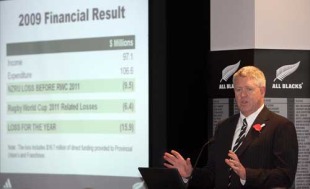|
New Zealand Rugby
NZRU announces record financial loss
Scrum.com
April 22, 2010

Steve Tew presents the NZRU numbers
© Getty Images
Enlarge
New Zealand Rugby Union (NZRU) officials have announced a record financial loss for 2009, but remain confident that their frugal approach will increase their bottom line in years to come. The NZ$15.9m [£7.35m] shortfall was due in part to a $6.3m investment in hosting the 2011 Rugby World Cup, with $4.2m expected to be recouped by the time of the tournament, and the $9.6m operating loss for the year went hand in hand with the recession according to chief executive Steve Tew. "We wanted to get the game largely through the pain without too much damage," Tew said. "If you wanted to make sure that the game stays alive during the worst recession that we've ever had, we believe these decisions were well considered. It [loss] is not a surprise, not a shock, but still a $16m loss." Measures introduced to cut costs included freezing NZRU salaries and providing no programme for the New Zealand Maori side, among other on-field cutbacks to the women's domestic game. A record financial loss came as no surprise to the New Zealand Rugby Union (NZRU), which is predicting more pain but a better bottom line over coming years. The NZRU also took the rare step of delving into cash reserves helping prop up grassroots rugby and increasing player payments. Those retained earnings decreased to $59.5m, of which $46.8m is cash. A drop in income was also recorded in terms of All Black Tests, where $4.2m less than the predicted figure was earned. The loss of a Bledisloe Cup Test in Denver, scrapped when US financial markets collapsed, was partly to blame while crowd numbers were down at several home venues. The high injury toll for senior players and All Blacks resulted in a $2.7 m budget blowout, with money funnelled into medical costs, replacement players and the subsequent rise in insurance premiums. Injured All Blacks continue to get paid for 12 months after suffering injuries and a whopping 46 players wore the black jersey in 2009. Unhedged foreign exchange movements ($2.6m loss) and reduced interest income ($2.2m) also made hefty contributions. World Cup investment resulted in a $2.1m real loss, in line with expectations under a deal where the NZRU covers one-third of the losses incurred by Rugby New Zealand (RNZ) 2011, the company charged with delivering the tournament. The NZRU expects to lose all its $10m capital investment in the company by the time the tournament kicks off. The $4.2m paper loss comes from a significant drop in the value of the British pound which has impacted on £18.5m ($39.7m) in funds held to meet World Cup hosting commitments. It is one-third of the tournament fee. The sum was revalued at the prevailing exchange rate as per accounting standards but Tew noted the gain from a deal to hedge the foreign exchange risk cannot be recognised on the balance sheet until the final transaction occurs, which will be in 2011. Therefore, the $4.2m loss was a timing distortion, which could occur again this year if the pound drops further. Tew was also buoyed by the five-year broadcast deal signed this month with Sky Television while other areas of NZRU business gave cause for optimism. "We have now secured a significant chunk of securable income right through to 2015. Also we have (chief sponsor) Adidas right through to 2019 and we think we're in a very good foreign exchange position because we're able to buy euros at an all-time low," he said. "So we've got certainty of income for a period of time, we've got good reserves and we're still managing our way through a pretty difficult financial time. But change still needs to be carefully managed." © Scrum.com
|
Live Sports
Communication error please reload the page.
-
Football
-
Cricket
-
Rugby
-
- Days
- Hrs
- Mins
- Secs
F1 - Abu Dhabi GP
Abu Dhabi Grand Prix December 11-131. Max Verstappen ()
2. Valtteri Bottas (Mercedes)
3. Lewis Hamilton (Mercedes)
4. Alexander Albon ()
5. Lando Norris ()
6. Carlos Sainz Jr ()
-
ESPNOtherLive >>
Snooker - China Open
Tennis - Miami Open

